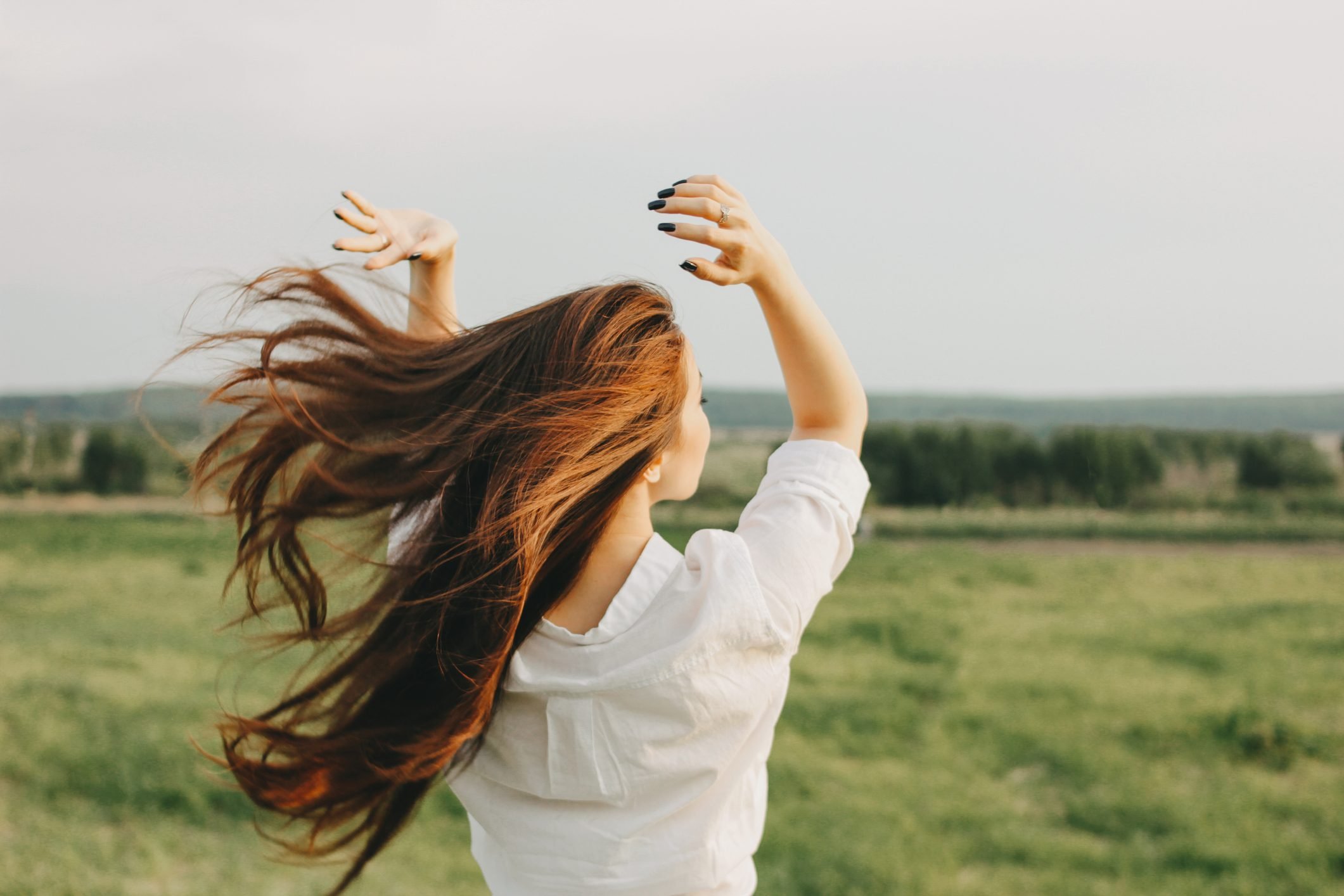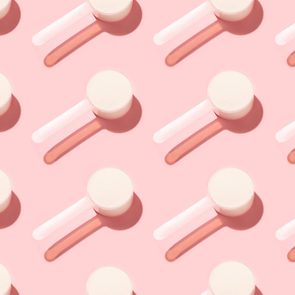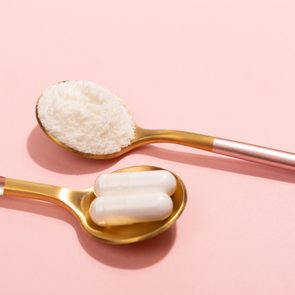Should You Use Collagen for Your Hair? What Experts Recommend
Updated: May 12, 2021
You'll see claims that collagen can help hair grow, thicken, and shine. Can you trust those promises?
Collagen and your hair
Collagen plays a role in building keratin—the primary protein in your hair. So it seems sensible that if you want healthier, thicker, and shinier hair, you might reach for a collagen-infused shampoo and conditioner and slather on collagen-formulated leave-in conditioner or finish with a collagen hair mist for extra measure. And if you’re coloring your hair at home, some brands’ included collagen conditioners promise to protect against damage and pesky gray hairs.
Unfortunately, it’s a bit more complicated than that. Here’s everything you need to know about taking collagen supplements for your hair. (And this is what to know about collagen for your skin.)
What is collagen?
To grasp how collagen may affect your hair, you first need to understand how naturally occurring collagen works. This is the stuff our bodies make, and its crucial role is the reason so many manufacturers are jumping on the collagen-supplement bandwagon.
Collagen is a fibrous, supportive protein that makes up bones, tendons, cartilage, ligaments, and skin. Its strong and flexible structures support and anchor cells to each other. Collagen is what cushions joints and makes skin plump.
Our bodies create collagen by breaking down protein from food into amino acids. Dairy, eggs, and cheese are all good sources of collagen-boosting protein, as are plant-based proteins from foods like beans, nuts, seeds, quinoa, tempeh, and tofu. And don’t forget the other key players in collagen production: vitamin C, zinc, copper, and sulfur.
What’s in collagen supplements and lotions?
While natural collagen is made inside your body, supplements and lotions get collagen from an outside source. And all of the products come with big promises.
Collagen-infused shampoos, conditioners, and other hair products tout the benefits of shinier, healthier, and stronger hair. Then there are the all-in-one collagen pills and powders that promise everything from younger-looking skin to joint pain relief, muscle building, and—you guessed it—thicker hair.
Collagen is available from three different sources:
- Animal-based collagen is made from the skin, muscles, bones, and tendons of cows, pigs, or chickens.
- Marine collagen is sourced from the scales, skin, and bones of various fish, including jellyfish and sponges.
- Vegan collagen is created without any animal by-products. It is genetically modified yeast and bacteria with human genes that code for collagen and digestive enzymes.
(Learn more about collagen pills.)
Why collagen for hair is so appealing
When you’re younger, collagen production is plentiful. It quietly works in the background to keep our skin firm and wrinkle-free, our muscles strong, and our joints flexible.
The catch: Collagen production slows as we age. Other factors contributing to the decline in production are radiation from the sun, smoking, and other oxidative stress, such as exposure to harsh cleaners and chemicals, pollution, diets high in fat and sugar, and drinking too much alcohol.
Once you hit your 20s, collagen starts to decrease by 1 percent a year. By your 40s, you’re probably well aware of the signs of lower collagen levels: wrinkles, looser skin, less flexibility in the joints, and maybe thinning and graying hair. That’s when collagen supplements start tempting us. They promise to plump skin, erase wrinkles, improve joints, and fix thinning, dry, or brittle hair.

The role of collagen in hair
So, where do the promises of collagen-infused products originate—and how can they claim to turn lackluster hair into the stuff of shampoo commercials? There are a couple of theories.
The middle layer of your skin (called the dermis) is about 70 percent collagen, which is one source of the claims. A healthy dermis might produce healthier hair—but that’s a theory. And don’t forget that the roots of your hair are found in the dermis, not the strands you shampoo, condition, and color.
“Collagen is not a component of hair,” says dermatologist Shari Lipner, MD, associate professor of clinical dermatology, Weill Cornell Medicine, New York City. “The main component of hair is keratin—about 95 percent.”
That leads to the second theory, which is that to make keratin, your body borrows a few amino acids from collagen. Having plenty of collagen available would in theory help your hair, but again there’s no evidence that swallowing collagen improves or increases the production of keratin.
What the science says
So far, here’s what the science, albeit limited, says about taking collagen for hair.
(Here are some collagen powder benefits to know.)
Can it improve hair growth?
In a small study published in the Journal of Drugs in Dermatology, 26 women with hair loss took four capsules containing collagen and other nutrients daily for six months. At the end of the trial, they had more hair growth than 14 other women who had taken a placebo.
That doesn’t mean collagen boosted hair growth, though. Because the pills contained more than just collagen, there’s no way to know which ingredient helped. (The supplement also included herbs, keratin, and capsaicin.) It may be that the combination led to growth. It’s also worth noting that the study was partially sponsored by the maker of the collagen supplement used by participants.
Another major caveat: Collagen in products gets broken down into amino acids, which the body absorbs like any other protein or amino acid—they don’t necessarily go to the areas where they might be needed. “The amino acids could contribute to hair growth, but there is limited evidence to support this,” says Dr. Lipner.
Can it protect aging hair?
Collagen products often promise to support collagen levels as they decrease with age. Even though collagen isn’t a direct component of hair, it is in the hair roots, which may cause the hair to thin as we age. In theory, collagen products could recharge the cells in the dermis to support the roots, which may result in less thinning hair. But again, this is a theory—not exactly reality.
“Collagen is a large molecule, and although you might try to apply it to the skin, there’s no evidence it would be able to be absorbed through the skin or hair,” says Houston-based dermatologist Rajani Katta, MD, who also serves as volunteer clinical faculty at Baylor College of Medicine and McGovern Medical School at UT Health.
When to see a doctor
Before you reach for a collagen product, it might be a smarter move to ask your doctor or dermatologist why your hair is thinning or falling out. A protein deficiency can cause hair loss, although that’s rare. More common reasons for thinning, hard-to-grow, or brittle hair are undiagnosed medical conditions or nutrient deficiencies.
“We will often check for thyroid disease and may check for iron, zinc, and vitamin B12 levels,” says Dr. Katta. If you’re experiencing hair loss, flaking, or scalp pain, see your physician or dermatologist. (Find out if Covid-19 can cause hair loss.)
Should you use collagen for hair growth?
Neither Dr. Lipner nor Dr. Katta recommend collagen products, citing a lack of evidence to support their use. A better solution, says Dr. Katta: add protein to your diet. “The amino acids found in collagen supplements are also found in lots of foods, which means you have other ways you can help your body get those amino acids,” says Katta
If you still want to give collagen hair supplements a try, do some research on the company that makes them. In general, experts agree most supplements are safe, but dietary supplements—including collagen supplements—aren’t regulated by the Food and Drug Administration. There’s no guarantee you’re getting pure or quality ingredients.
Check the label for third-party verification, such as those from UL, United States Pharmacopeia (USP), or NSF International.
Healthy hair tips
There are a number of steps that you can take to ensure healthy hair and scalp without using collagen. First, determine how often to shampoo your hair. If your hair and scalp tend to be oily, you should wash it daily. If it’s dry, wash it is less—two to three times a week, Dr. Lipner says.
You might notice your scalp is drier as you age, which is totally normal. Chemical treatments (like covering those grays) can also make the hair drier.
“When you wash your scalp, concentrate the shampoo on your scalp rather than your hair for maximal shine,” says Dr. Lipner. “It is important to use conditioner following each wash. Conditioner improves shine, decreases static electricity, and increases strength.”
Apply the conditioner to the ends, not your scalp, which will make your hair limp. And if you’re a swimmer, fight chlorine damage by wetting and conditioning your hair before diving in.





















